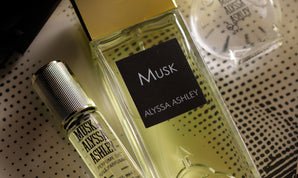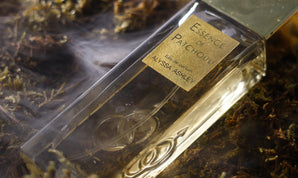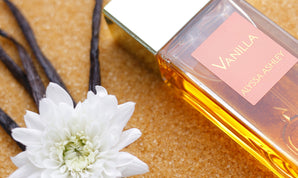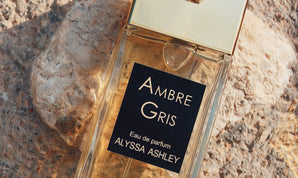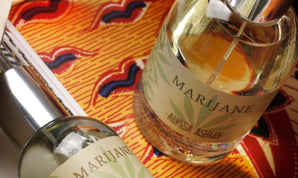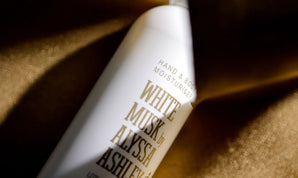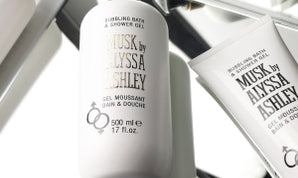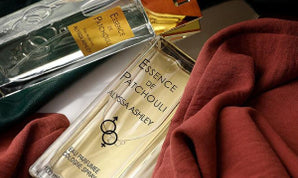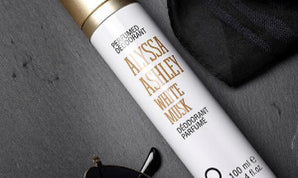Consumers and serial purchasers of perfumes should always be aware of a few simple rules to consider in order to guaranty that a fragrance remains unaltered over the years. Once worn, how should it be sprayed? On which parts of the body should it be applied in order to feel covered in a long-lasting scent trail?
First of all, we need to consider the fundamental difference between the percentages of essential oils used in a fragrance. When we go into a perfumery, we are tempted by a multitude of fragrances, and every time we make a choice there is a risk of making a mistake, so to avoid this we need to consider the difference between Parfum, Eau de Parfum, Eau de Toilette and Eau de Cologne.
A higher concentration naturally results in a more intense and often more persistent aroma. But that's not all: at a higher concentration and with a different solvent, some notes may develop better, more present or more rounded.
The most seductive formulation with the most saturation is undoubtedly Parfum, the ultimate expression for a perfume. The essential oils vary between 25% and 30%. In this case, the intensity and persistence that will accompany you throughout the day will be greater, due to the prevalence of the tail notes, with the lowering of all the more volatile notes, i.e. those that give the fragrance a greater initial volume which then tend to fade away.
Eau de Parfum is a mixture with a percentage of essence, more or less between 15% and 20% (percentages today vary a lot, the perception depends on the construction of the formula). This formulation allows the perfume to last for hours on the skin and is suitable for anyone who wishes to wear it but above all, for those who need to feel their perfume throughout the whole day, and this is achieved by enhancing the heart and base notes, which are the least volatile.
The Eau de Toilette is lighter than the Eau de Parfum due to the lower percentage of essential oils which falls approximately between 12% and 15%, ideal for perfuming oneself in a more discreet manner.
Eau e Cologne or Eau Parfumee is a mixture of essential oils between 3% and 5%. It’s the most ideal to spray yourself with after a shower, especially in the summer, or if you have delicate skin but don't want to go without perfume.
How long does a perfume last? But more importantly, how do you make perfume last longer?
The duration of a perfume does not only depend on where and how it is applied, but also on how the fragrance itself is preserved over time, and on whether it is sprayed or splashed: it is said that perfumes are not eternal; which is true but only up to a certain point, because with a few tricks, you can extend the duration of a perfume considerably.
If you buy a perfume spray, the aroma will remain intact for years, without any particular variations, if you keep it in the box, in the dark, away from sources of light, heat and humidity, at a cool and constant temperature. However, if you open the package to use the perfume even just once, its duration will be reduced with a loss of the most volatile substances, especially if it is splashed, because they will tend to disperse when they come into contact with the air. In order to ensure that the alcohol contained will not evaporate, and consequently not disrupt the chemical balance of the substances contained in the fragrance, you must close it well. Dark glass bottles will protect the fragrance even better.
Where to apply perfume and how to do it correctly.
Especially during the summer, in order to avoid constant refreshments throughout the day to ensure that the perfume doesn't fade quickly, it's time to clarify once and for all where we go wrong when applying perfume.
Assuming that the fragrance should be sprayed a few centimetres away from the skin, it is necessary to exploit the so-called pulse points, i.e. those parts of the body which tend to heat up more, due to physiology, and which will therefore help to diffuse the fragrance better. These are points where the veins are closer to the skin, points where the blood circulation flows and where the aroma vibrates more, more consistently covering the skin and forming some kind of a perfumed layer. These are 6 zones that I like to call 'secrets'.
-
Hair
This is the best way to enable the fragrance to linger for anyone who walks by. Remember, however, that the alcohol contained in many perfumes damages and dries out the hair, so the advice is to never spray it directly on the head but on a make-up brush and then disperse the fragrance on the head with small and quick gestures.
-
Behind the ears
Like the wrists, those few centimetres behind the ears are considered "pulse points", the ones that heat up most easily. Dabbing your perfume on these points will certainly give you more immediate results.
-
Along the back
It may sound strange, but fragrance expert Chandler Burr insists that perfume needs to exude a perfect balance so it's neither too subdued nor too overpowering for the noses of those around you. That's why his advice is to turn up the collar of the dress/shirt you're wearing and spray a breeze down the back between your head and your skin before you leave the house. If it is a light fragrance, a double spray is also allowed.
This will allow the fragrance to become a kind of like a second skin, completely submerged with your body.
-
Inside the elbows
An alternative to the wrists and able to maximise the diffusion of the fragrance because mobile and strategic "pulse points" with respect to the body's natural movements. Always remember, however, to moisturise your arms well before each spray.
-
Behind the knees
The basic rule is that heat rises and fragrances evaporate. That's why it makes sense to apply a fragrance somewhere on the lower part of the body: because it evaporates during the day and releases freshness naturally. That's why, just like the inside of your elbows, the back of your knees is the most logical place to spray perfume on your lower limbs.
-
Belly button
A little trick stolen directly from Liv Tyler, inherited in turn from her father Steven: "I put a few drops of perfume on my fingers and then with little touches I spray it under my arms and on my belly button". Try it to believe it!
One rule to remember: the duration and persistence of a perfume varies according to the PH of the skin and, to prevent the fragrance from evaporating too quickly, the pulse points I mentioned should be well moisturised with a cream that is absolutely neutral or has the exact same scent as the perfume. Beware of spraying on clothes, scarves and coats unless you always use the same fragrance, a rare habit for enthusiasts like us, and remember that perfume can stain fabrics.
